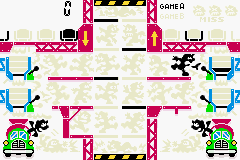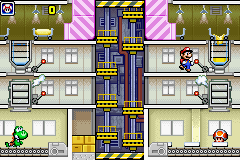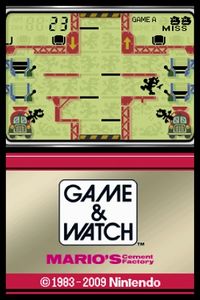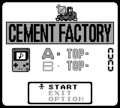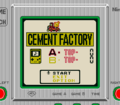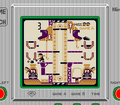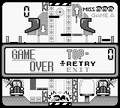Mario's Cement Factory: Difference between revisions
m (Text replacement - "{{Mario games}}" to "{{Super Mario games}}") |
|||
| (41 intermediate revisions by 15 users not shown) | |||
| Line 1: | Line 1: | ||
{{more | {{media missing|more=yes|DSi version}} | ||
{{italic title}} | {{italic title}} | ||
{{game infobox | {{game infobox | ||
|image=[[File: | |image=[[File:MCF System.png|250px]]<br>The New Wide Screen version of ''Mario's Cement Factory'' | ||
|developer=[[Nintendo Research & Development 1|Nintendo R&D 1]] | |developer=[[Nintendo Research & Development 1|Nintendo R&D 1]] | ||
|publisher=[[Nintendo]] | |publisher=[[Nintendo]] | ||
|release='''Game & Watch:'''<br>{{ | |release='''Game & Watch:'''<br>{{flag list|USA|April 28, 1983<ref name=TT>{{Cite|archive=https://web.archive.org/web/20210928071507/http://www.intheattic.co.uk/mario's_cement_factory1.htm|title=Mario's Cement Factory|publisher=In The Attic|language=en-gb}}</ref> (Table Top)}} {{flag list|USA|June 16, 1983<ref name=NWS>{{Cite|archive=https://web.archive.org/web/20200219132835/http://www.intheattic.co.uk/mario's_cement_factory.htm|title=Mario's Cement Factory|publisher=In The Attic|language=en-gb}}</ref> (New Wide Screen)}} '''Mini Classics:'''<br>{{flag list|Europe|1998|USA|1999}} '''Nintendo DSi ([[DSiWare]]):'''<br>{{flag list|Japan|August 19, 2009|USA|March 22, 2010|Europe|March 26, 2010<ref>{{Cite|url=https://www.nintendo.com/en-gb/Games/Nintendo-DSiWare/Game-Watch-Mario-s-Cement-Factory-263357.html|title=Game & Watch™ Mario's Cement Factory - Nintendo|publisher=Nintendo UK|language=en-gb}}</ref>|Australia|March 26, 2010|China|February 17, 2011}} '''Nintendo 3DS ([[Nintendo eShop#Nintendo 3DS|eShop]]):'''<br>{{flag list|Japan|June 6, 2011|USA|June 6, 2011|Australia|June 6, 2011|Europe|July 7, 2011}} | ||
|genre=Puzzle/Platformer | |genre=Puzzle/Platformer | ||
|modes=Single player | |modes=Single player | ||
|ratings={{ratings|esrb=E}} | |ratings={{ratings|esrb=E|cero=A|pegi=3|usk=0|acb=G}} | ||
|platforms=[[Game & Watch]], [[Mini Classics]], [[Nintendo DSi]], [[Nintendo 3DS]] | |platforms=[[Game & Watch]], [[Mini Classics]], [[Nintendo DSi]], [[Nintendo 3DS]] | ||
|input={{input|gaw=1|ds=1|3ds=1}} | |input={{input|gaw=1|ds=1|3ds=1}} | ||
| | |format={{format|gaw=1|dsidl=1|3dsdl=1}} | ||
}} | }} | ||
'''''Mario's Cement Factory''''' is a [[Game & Watch]] game. Two versions of the game were produced: The first was for the Game & Watch Table Top released on April 28, 1983, and the second was a more conventional New Wide Screen Game & Watch that was released on June 16, 1983. ''Mario's Cement Factory'' was the first game in the Table Top series. The Table Top game resembles an arcade cabinet, and it is more colorful than the New Wide Screen game. In both versions, [[Mario]]'s mission in the | '''''Mario's Cement Factory''''' is a [[Game & Watch]] game. Two versions of the game were produced: The first was for the Game & Watch Table Top released on April 28, 1983,<ref name=TT/> and the second was a more conventional New Wide Screen Game & Watch that was released on June 16, 1983.<ref name=NWS/> ''Mario's Cement Factory'' was the first game in the Table Top series. The Table Top game resembles an arcade cabinet, and it is more colorful than the New Wide Screen game. In both versions, [[Mario]]'s mission in the [[Cement Factory]] is to open doors to prevent cement containers from overflowing. To get to the different containers, Mario has to jump onto moving [[platform]]s. The New Wide Screen version was rereleased as a [[Mini Classics]] game and is featured in the [[Museum|Gallery Corner]] in ''[[Game & Watch Gallery]]''. It is also featured as a [[minigame]] in ''[[Game & Watch Gallery 4]]'' with a Classic version and an updated "Modern" version. | ||
{{multiple image | {{multiple image | ||
| Line 30: | Line 30: | ||
|caption2=Table Top version | |caption2=Table Top version | ||
}} | }} | ||
The alarm indicator of the Table Top version is a bell that is located beside the upper lift section, and | The alarm indicator of the Table Top version is a bell that is located beside the upper lift section, and [[Alarm man (Mario's Cement Factory)|a driver]] rings the bell when the alarm goes off. In the New Wide Screen version, the alarm indicator is a bell located beside the upper lift section, but the bell simply swings when the alarm goes off. | ||
''Mario's Cement Factory'' also appears as one of the minigames in ''{{wp|Game Boy Gallery}}'', though it is simply called '''Cement Factory''' and features no | ''Mario's Cement Factory'' also appears as one of the minigames in ''{{wp|Game Boy Gallery}}'', though it is simply called '''Cement Factory''' and features no characters from the [[Super Mario (franchise)|''Super Mario'' franchise]], and the playable character is the same unnamed character seen in the other minigames. | ||
{{br|left}} | {{br|left}} | ||
==Gameplay== | ==Gameplay== | ||
===Classic version=== | ===Classic version=== | ||
[[File:G & W Gallery 4 Mario's Cement Factory.png|thumb|left|460px|The Classic version of ''Mario's Cement Factory'']] | [[File:G & W Gallery 4 Mario's Cement Factory.png|thumb|left|460px|The Classic version of ''Mario's Cement Factory'']] | ||
There are two | There are two [[driver]]s, each in a truck under a container. Mario earns a [[point]] each time he empties a load of cement from the upper hopper and two points each time he empties a load from the lower hopper. Each container can hold only three loads of cement. Allowing the containers to overflow causes cement to spill down onto the drivers, hurting them and giving Mario one miss. Falling off an [[lift|elevator]] platform also earns a miss, as well as touching the very top of the screen and getting crushed by an elevator platform, or touching the very bottom and getting shocked by the floor of the elevator. In all versions of the game, there is an area on the lowermost portion of the elevator that Mario can use to save himself from touching the very bottom and getting shocked. On the Table Top and ''Game Boy Gallery'' versions, there is a similar area on the uppermost portion of the elevator. This does not appear on any other version of the game. If Mario gets 300 points without any misses, the points will be worth double until he does get a miss. If he has any misses at said score, all misses will be cleared instead. When he receives three misses, the [[Game Over|game is over]]. | ||
===Modern version=== | ===Modern version=== | ||
| Line 48: | Line 48: | ||
==Controls== | ==Controls== | ||
*{{button|gba| | *{{button|gba|padleftright}}: Move | ||
*{{button|gba|A}} and {{button|gba|B}}: Open | *{{button|gba|A}} and {{button|gba|B}}: Open | ||
| Line 54: | Line 54: | ||
[[File:Mario's_Cement_Factory_DSiWare_Gameplay.jpg|thumb|left|The DSiWare version of ''Mario's Cement Factory'']] | [[File:Mario's_Cement_Factory_DSiWare_Gameplay.jpg|thumb|left|The DSiWare version of ''Mario's Cement Factory'']] | ||
[[File:MCF DSiWare.png|thumb|DSiWare version's icon]] | [[File:MCF DSiWare.png|thumb|DSiWare version's icon]] | ||
Another port of the | Another port of the New Wide Screen version was released in August 2009 for [[DSiWare]] in Japan and March 2010 in America, Europe, and Australia. It is also available in the [[Nintendo 3DS#Nintendo eShop|Nintendo 3DS eShop]] as DSiWare. In July–August 2012, to coincide with the release of ''[[New Super Mario Bros. 2]]'', it was featured on the Mario folder in the main screen. | ||
{{br}} | {{br}} | ||
| Line 67: | Line 67: | ||
==Gallery== | ==Gallery== | ||
{{more | {{image|more=yes|All sprites and sprite animations|section=yes}} | ||
<gallery> | <gallery> | ||
MCF. | Mario's Cement Factory Table Top box.jpg|Table Top box | ||
MarioCMTFactoryBoxArt.jpg|Box art for the New Wide Screen version | MCF Tabletop.png|Table Top version | ||
MarioCMTFactoryBoxArt.jpg|Box art for the New Wide Screen version | |||
Mario's Cement Factory NWS box alt.png|Alternate box art for the New Wide Screen version | |||
Mario Bros Mitubishi.jpg|Mitubishi version | |||
10320 Mini Flat Front.jpg|Mini Classics version | |||
MCF LCD pattern.png|LCD pattern | |||
Mario's Cement Factory commercial.png|[[Mario]] in the Table Top version's TV commercial | Mario's Cement Factory commercial.png|[[Mario]] in the Table Top version's TV commercial | ||
MCMNWSSMarioSprite.png||A sprite of Mario | MCMNWSSMarioSprite.png||A sprite of Mario | ||
| Line 84: | Line 89: | ||
G&WG4 Modern Mario's Cement Factory Bucket.png|[[Bucket]] | G&WG4 Modern Mario's Cement Factory Bucket.png|[[Bucket]] | ||
G&WG4 Modern Mario's Cement Factory Lift.png|[[Lift]] | G&WG4 Modern Mario's Cement Factory Lift.png|[[Lift]] | ||
G&WG4 Modern Mario's Cement Factory Switch.png| | G&WG4 Modern Mario's Cement Factory Switch.png|Switch | ||
G&WG4 Modern Mario's Cement Factory Toad.png|[[Toad]] | G&WG4 Modern Mario's Cement Factory Toad.png|[[Toad]] | ||
G&WG4 Modern Mario's Cement Factory Yoshi.png|[[Yoshi]] | G&WG4 Modern Mario's Cement Factory Yoshi.png|[[Yoshi]] | ||
| Line 99: | Line 104: | ||
==References in later games== | ==References in later games== | ||
*[[Super Smash Bros. (series)|''Super Smash Bros.'' series]]: [[Mr. Game & Watch]] has an attack that involves him grabbing opponents with a similar pose to how Mario grabs levers in this game. | *[[Super Smash Bros. (series)|''Super Smash Bros.'' series]]: [[Mr. Game & Watch]] has an attack that involves him grabbing opponents with a similar pose to how Mario grabs levers in this game. | ||
*'' | *''[[Rhythm Heaven Fever]]'' and ''[[Rhythm Heaven Megamix]]'': Mr. Game & Watch appears in [[rhythmheaven:Working Dough|Working Dough]], where he is posed similarly to the lever-grabbing animation from this game. | ||
==Trivia== | ==Trivia== | ||
| Line 114: | Line 119: | ||
|caption3=The jingle, slowed down and pitch-shifted to match the song's tempo and pitch, combined with the song itself | |caption3=The jingle, slowed down and pitch-shifted to match the song's tempo and pitch, combined with the song itself | ||
}} | }} | ||
*Early models of the Table Top version of ''Mario's Cement Factory'' used a slightly faster rearrangement of the | *Early models of the Table Top version of ''Mario's Cement Factory'' used a slightly faster rearrangement of the bass riff from "{{wp|Another One Bites the Dust}}," a song released in 1980 by the British rock band {{wp|Queen (band)|Queen}}, for the game start jingle.<ref>{{cite|author=Old80s: Retro Stuff And More|date=January 15, 2020|title=Game & Watch: Mario's Cement Factory (Table Top, CM-72) (Another One Bites The Dust) (1983 Nintendo)|url=https://www.youtube.com/watch?v=_ygFCJM8wN8|publisher=YouTube|language=English|accessdate=May 14, 2022|archive=https://web.archive.org/web/20240606155233/https://www.youtube.com/watch?v=_ygFCJM8wN8}}</ref> This was replaced in a later revision with an original jingle.<ref>{{cite|author=Old80s: Retro Stuff And More|date=January 21, 2022|title=Game & Watch: Mario's Cement Factory (Table Top, CM-72A) (Alternate) (1983 Nintendo)|url=https://www.youtube.com/watch?v=sHXnPJ9fPCs|publisher=YouTube|language=English|accessdate=May 14, 2022|archive=https://web.archive.org/web/20240810004619/https://www.youtube.com/watch?v=sHXnPJ9fPCs%20CM-72A}}</ref> An update of this jingle reappears in the ''Game Boy Gallery'' version.<ref>{{cite|author=All Nintendo Music|date=November 18, 2019|title=GameBoy Gallery Complete Soundtrack|url=https://www.youtube.com/watch?v=8yH1yr2rgMQ&t=560s|publisher=YouTube|language=English|accessdate=May 14, 2022|archive=https://web.archive.org/web/20230330224720/https://www.youtube.com/watch?v=8yH1yr2rgMQ}}</ref> | ||
==References== | ==References== | ||
| Line 131: | Line 136: | ||
{{Game & Watch}} | {{Game & Watch}} | ||
{{DS}} | {{DS}} | ||
{{Game & Watch Gallery}} | |||
[[Category:Mario's Cement Factory|*]] | |||
[[Category:Games]] | [[Category:Games]] | ||
[[Category:Game & Watch games]] | [[Category:Game & Watch games]] | ||
[[Category:Mini Classics games]] | |||
[[Category:DSiWare]] | [[Category:DSiWare]] | ||
[[Category:1983 games]] | [[Category:1983 games]] | ||
[[Category:Mario games]] | [[Category:Super Mario games]] | ||
[[Category:Puzzle games]] | [[Category:Puzzle games]] | ||
[[Category:Platforming games]] | [[Category:Platforming games]] | ||
[[Category:LCD and VFD games]] | |||
[[Category:Game & Watch Gallery 4 minigames]] | |||
[[de:Mario's Cement Factory]] | [[de:Mario's Cement Factory]] | ||
[[it:Mario's Cement Factory]] | [[it:Mario's Cement Factory]] | ||
Latest revision as of 07:15, January 2, 2025
| It has been requested that more audio and/or video files related to this article be uploaded. Specifics: DSi version Please upload all related music, sound effects, voice clips, or any videos for this article. See the help page for information on how to get started. |
| Mario's Cement Factory | |||||||||||
|---|---|---|---|---|---|---|---|---|---|---|---|
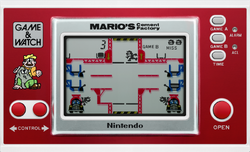 The New Wide Screen version of Mario's Cement Factory | |||||||||||
| Developer | Nintendo R&D 1 | ||||||||||
| Publisher | Nintendo | ||||||||||
| Platform(s) | Game & Watch, Mini Classics, Nintendo DSi, Nintendo 3DS | ||||||||||
| Release date | Game & Watch: Mini Classics: Nintendo DSi (DSiWare): Nintendo 3DS (eShop): | ||||||||||
| Genre | Puzzle/Platformer | ||||||||||
| Rating(s) |
| ||||||||||
| Mode(s) | Single player | ||||||||||
| Format | Game & Watch:
Built-in Nintendo DSi:
Nintendo 3DS: | ||||||||||
| Input | Game & Watch:
Nintendo DS: Nintendo 3DS:
| ||||||||||
Mario's Cement Factory is a Game & Watch game. Two versions of the game were produced: The first was for the Game & Watch Table Top released on April 28, 1983,[1] and the second was a more conventional New Wide Screen Game & Watch that was released on June 16, 1983.[2] Mario's Cement Factory was the first game in the Table Top series. The Table Top game resembles an arcade cabinet, and it is more colorful than the New Wide Screen game. In both versions, Mario's mission in the Cement Factory is to open doors to prevent cement containers from overflowing. To get to the different containers, Mario has to jump onto moving platforms. The New Wide Screen version was rereleased as a Mini Classics game and is featured in the Gallery Corner in Game & Watch Gallery. It is also featured as a minigame in Game & Watch Gallery 4 with a Classic version and an updated "Modern" version.
The alarm indicator of the Table Top version is a bell that is located beside the upper lift section, and a driver rings the bell when the alarm goes off. In the New Wide Screen version, the alarm indicator is a bell located beside the upper lift section, but the bell simply swings when the alarm goes off.
Mario's Cement Factory also appears as one of the minigames in Game Boy Gallery, though it is simply called Cement Factory and features no characters from the Super Mario franchise, and the playable character is the same unnamed character seen in the other minigames.
Gameplay[edit]
Classic version[edit]
There are two drivers, each in a truck under a container. Mario earns a point each time he empties a load of cement from the upper hopper and two points each time he empties a load from the lower hopper. Each container can hold only three loads of cement. Allowing the containers to overflow causes cement to spill down onto the drivers, hurting them and giving Mario one miss. Falling off an elevator platform also earns a miss, as well as touching the very top of the screen and getting crushed by an elevator platform, or touching the very bottom and getting shocked by the floor of the elevator. In all versions of the game, there is an area on the lowermost portion of the elevator that Mario can use to save himself from touching the very bottom and getting shocked. On the Table Top and Game Boy Gallery versions, there is a similar area on the uppermost portion of the elevator. This does not appear on any other version of the game. If Mario gets 300 points without any misses, the points will be worth double until he does get a miss. If he has any misses at said score, all misses will be cleared instead. When he receives three misses, the game is over.
Modern version[edit]
The Modern version of the game has Mario working in a cookie factory. Yoshi and Toad are featured instead of the drivers, with Yoshi eating the Yoshi Cookies made on the left conveyor belt and Toad packaging the Yoshi Cookies made on the right conveyor belt. Boos also occasionally appear, taking up cookie dough slots on the second floor. Unlike in Classic Mode, however, Mario is allowed to fall down onto an elevator platform, but touching the very bottom or top still earns the player a miss. When Mario amasses 200, 500, and 700 points, a heart appears for him to remove a miss. Music is also featured in this version, with the tempo changing depending on the speed of the game.
Selecting the game without starting it also results in a humorous sequence being played. In particular, Yoshi and Toad are putting cookie batter on a conveyor belt each, only for Toad's batter to get stolen by a Boo, causing him to cry, and then the Boo drops the batter on Yoshi, with it being a large enough quantity that Yoshi is engulfed save for the eyes, while the Boo sticks out his tongue in a taunting manner as Yoshi is baffled at the entire situation.
Controls[edit]
 : Move
: Move and
and  : Open
: Open
DSiWare[edit]
Another port of the New Wide Screen version was released in August 2009 for DSiWare in Japan and March 2010 in America, Europe, and Australia. It is also available in the Nintendo 3DS eShop as DSiWare. In July–August 2012, to coincide with the release of New Super Mario Bros. 2, it was featured on the Mario folder in the main screen.
DSi Shop description[edit]
American[edit]
Nintendo first began releasing the Game & Watch series in 1980. This collection of games was available on portable LCD devices, and each title featured a game and a clock. Each Game & Watch title features two modes of play: GAME A (normal difficulty) and GAME B (more advanced play). While some controls have been changed in the DSiWare version to better suit the Nintendo DSi system, the appearance of the game itself has not been altered.
Conveyor belts carry tubs of cement to the mixers below. Use the elevators to move Mario to different levels of the factory, dumping cement from the top mixers to the mixers below and into the trucks. Earn points for every load of cement you drop from the mixers to the cement truck. Receive mistake icons by letting a mixer overflow with cement, trying to get on an elevator when you are not level with it, or hitting the floor or ceiling while riding an elevator; receive three mistake icons, and it's game over!
European[edit]
Experience a piece of Nintendo history with the Game & Watch series for Nintendo DSiWare. Each title is a perfect recreation of a classic LCD game from the early 1980s, including normal Game A and alternate Game B modes. And no Game & Watch title would be complete without the 'Watch' function - each title includes a fully functional clock. In Mario’s Cement Factory, your job is to keep the factory going. Move Mario around the platforms and elevators, pull the levers to drop cement into containers, and fill up the trucks waiting to make their deliveries. Just like other Game & Watch titles, Game B mode is the tougher challenge; with faster, randomly moving platforms.
Gallery[edit]
It has been requested that more images be uploaded for this section. Remove this notice only after the additional images have been added. Specifics: All sprites and sprite animations
Modern version[edit]
Game Boy Gallery (Cement Factory)[edit]
Mode select (Super Game Boy)
References in later games[edit]
- Super Smash Bros. series: Mr. Game & Watch has an attack that involves him grabbing opponents with a similar pose to how Mario grabs levers in this game.
- Rhythm Heaven Fever and Rhythm Heaven Megamix: Mr. Game & Watch appears in Working Dough, where he is posed similarly to the lever-grabbing animation from this game.
Trivia[edit]
- Early models of the Table Top version of Mario's Cement Factory used a slightly faster rearrangement of the bass riff from "Another One Bites the Dust," a song released in 1980 by the British rock band Queen, for the game start jingle.[4] This was replaced in a later revision with an original jingle.[5] An update of this jingle reappears in the Game Boy Gallery version.[6]
References[edit]
- ^ a b Mario's Cement Factory. In The Attic (British English). (Archived September 28, 2021, 07:15:07 UTC via Wayback Machine.)
- ^ a b Mario's Cement Factory. In The Attic (British English). (Archived February 19, 2020, 13:28:35 UTC via Wayback Machine.)
- ^ Game & Watch™ Mario's Cement Factory - Nintendo. Nintendo UK (British English).
- ^ Old80s: Retro Stuff And More (January 15, 2020). Game & Watch: Mario's Cement Factory (Table Top, CM-72) (Another One Bites The Dust) (1983 Nintendo). YouTube (English). Retrieved May 14, 2022. (Archived June 6, 2024, 15:52:33 UTC via Wayback Machine.)
- ^ Old80s: Retro Stuff And More (January 21, 2022). Game & Watch: Mario's Cement Factory (Table Top, CM-72A) (Alternate) (1983 Nintendo). YouTube (English). Retrieved May 14, 2022. (Archived August 10, 2024, 00:46:19 UTC via Wayback Machine.)
- ^ All Nintendo Music (November 18, 2019). GameBoy Gallery Complete Soundtrack. YouTube (English). Retrieved May 14, 2022. (Archived March 30, 2023, 22:47:20 UTC via Wayback Machine.)
External links[edit]
- North American site
- Nintendo UK site
- Info page for the Table Top version of Mario's Cement Factory on In the Attic, a website dedicated to classic videogames (Internet Archive: Wayback Machine)
- Info page for the New Wide Screen version of Mario's Cement Factory on In the Attic (Internet Archive: Wayback Machine)
| Game & Watch games | ||
|---|---|---|
| Super Mario franchise | Donkey Kong (1982, MS) • Mario Bros. (1983, MS) • Mario's Cement Factory (1983, TT/NWS) • Mario's Bombs Away (1983, PS) • Donkey Kong Hockey (1984, MVS) • Super Mario Bros. (1986, CrS | 1987, Sp | 1988, NWS) • Mario the Juggler (1991, NWS) • Game & Watch: Super Mario Bros. (2020, CoS) | |
| Donkey Kong franchise | Donkey Kong (1982, MS) • Donkey Kong Jr. (1982, NWS | 1983, TT/PS) • Donkey Kong II (1983, MS) • Donkey Kong 3 (1984, MVS) • Donkey Kong Circus (1984, PS) • Donkey Kong Hockey (1984, MVS) | |
| Miscellaneous | Green House (1982, MS) | |
| MS: Multi Screen • TT: Table Top • PS: Panorama Screen • NWS: New Wide Screen • MVS: Micro VS. System • CrS: Crystal Screen • Sp: Special • CoS: Color Screen | ||
| Game & Watch Gallery series | ||
|---|---|---|
| Games | Game & Watch Gallery (1997, GB) • Game & Watch Gallery 2 (1997, GB) • Game & Watch Gallery 3 (1999, GBC) • Game & Watch Gallery 4 (2002, GBA) | |
| Super Mario minigames | Donkey Kong2,4 • Donkey Kong Jr.3,4 • Donkey Kong II3 • Donkey Kong 34 • Mario Bros.3,4 • Mario's Bombs Away4 • Mario's Cement Factory4 | |
| Minigames remade with Super Mario content |
Ball2 • Boxing4 • Chef2,4 • Egg3 • Fire1,4 • Fire Attack4 • Greenhouse3 • Helmet2 • Manhole1 • Octopus1,4 • Oil Panic1 • Parachute2 • Rain Shower4 • Turtle Bridge3 • Vermin2 | |
| Gallery Corner | Message Board • Museum • Music Room | |
| Further info | Gallery (2 · 4) • Pre-release and unused content (4) • Staff (2 · 3 · 4) | |
| Related game | Game & Watch Collection | |


